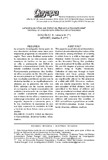La Familia de Niños con Déficit de Atención e Hiperactividad

Voir/
Date
2014-07Palabras Clave
Déficit de Atención e Hiperactividad, Dinámica familiar, Niños, MadresAttention Deficit Disorder, Family dinamics, Children, Mothers
Metadatos
Afficher la notice complèteRésumé
La presente investigación forma parte de una disertación doctoral como base para mejorar los programas de educación en la región. Tuvo como finalidad comprender la naturaleza de las interacciones entre miembros de familias en las que existe un niño o adolescente con Déficit de Atención e Hiperactividad (DAH). En este estudio cualitativo basado en la Teoría Fundamentada participaron diez familias de niños cursantes de 4to, 5to y 6to grado de escuela primaria en Trujillo, Venezuela. Los resultados permitieron concluir que la dinámica familiar se ve significativamente alterada por la presencia del niño con DAH; además son las madres quienes, en su mayoría, se hacen responsables del cuidado y la educación de sus hijos. Ellas se sienten sumamente comprometidas con el futuro de los niños y muestran una sobrecarga emocional, que se traduce en angustia, depresión y cansancio; pero, a la vez, mantienen la esperanza de que sus hijos superarán la condición de DAH y tendrán un buen futuro como personas adultas.
Colecciones
Información Adicional
| Otros Títulos | The Family of Children with Attention Deficit Disorder |
| Correo Electrónico | cayapa@ula.ve |
| ISSN | 1317-5734 |
| Resumen en otro Idioma | This paper is a part of doctoral dissertation. It aimed at understanding the nature of the interactions among members of a familiy in which there is a child or teenager with Attention Deficit Disorder (ADD). Based on the Grounded Theory, this qualitative research involved 10 families and their 4th, 5th and 6th degree of primary education children living in Trujillo, Venezuela. Collection of data was through In-depth interviews and focus groups. Results allowed to conclude that family dynamics are significantly altered by the presence of a child with ADD. Moreover, mothers, who are mostly responsible for the care and education of their children, feel very committed to the future of children and show an emotional overload, which results in anxiety, depression and fatigue; but, at the same time, maintain the hope that their children will overcome the condition of ADD and will have a good future as adults. |
| Colación | 83-95 |
| País | Venezuela |
| Institución | Universidad de Los Andes (ULA) |
| Publicación Electrónica | Revista Cayapa |
| Sección | Revista Cayapa: Artículos |





